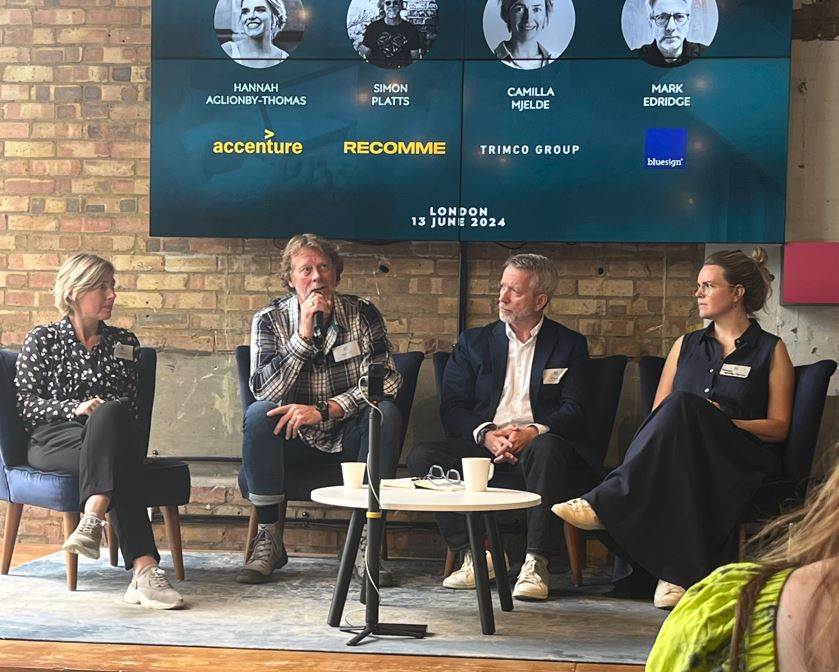DPP and circularity frame Fashion360 event
19/06/2024

The event aims to create “a global community of fashion industry professionals, sharing knowledge through a series of collaborative workshops”.
A panel made up of Cyndi Rhoades, CEO of Circle-8 Textile Ecosystems and founder of Worn Again Technologies; Debbie Luffman, CEO of Think Circular Consulting; and Martha Willis, EU programme director of Accelerating Circularity, offered their views on solutions for different sectors of the industry.
Ms Rhoades shared that as part of the Autosort for Circular Textiles Demonstrator (ACT UK) with UKFT, progress is being made towards setting up collections and sorting systems for used garments. Using Tomra’s sensor-based technology, which can detect garments’ material make-up, a large-scale facility is expected to be operational by the end of next year and will offer a blueprint for national roll-out.
Accelerating Circularity has recently concluded a pilot project to map the recycling infrastructure in Europe and the US, and Ms Willis pointed out that, with the EU’s Waste Directive expected to come into force by January 1, 2025, the UK might follow some European countries’ lead in adding dedicated textiles bins for households.
Ms Luffman’s stance was that brands and retailers need to change their mindsets at the design stage. As a former product director at outdoor brand Finisterre and now a consultant, she helps “translate” regulation and works with brands to set targets and think more holistically, making better fabric choices that will enable garments to be worn longer.
The compliance challenges for meeting the EU Digital Product Passport (DPP) regulations were simplified by Trimco’s sustainability and compliance director, Camilla Mjelde. She explained how the QR codes on labels – printed on most garments, but potentially woven on jeans so they can withstand industrial wash processes – will be capable of containing all the necessary information, once gathered by brands and manufacturers.
Cyrus Gilbert-Rolfe, chief commercial officer at Kezzler, said if each product has an individual code, it could be used to store and display every transaction, through manufacturing, shipping and sale, to care, repair and recycle instructions, even connecting to resale sites to simplify the process for consumers. The technical architecture that underpins the Digital Product Passport is currently being debated by technology exerts across Europe, he added, with a decision expected by summer.
Hannah Aglionby-Thomas from Accenture Song; Simon Platts, co-founder of Recomme.co; and Mark Edridge, a consultant at Bluesign (pictured), discussed how the industry can engage consumers in the sustainability story and how industry can speed up the process – making the collection or the resale of goods resource- and cost-efficient. Ms Aglionby-Thomas believes a nuanced approach to conveying sustainability messages to consumers is key, as groups respond to different messages. Both Mr Edridge and Mr Platts believe a new economic model is necessary, in terms of moving away from the constraints of KPIs (key performance indicators) and profits, and making environmental, social and governance compliance more financially attractive, for instance building it into managements’ remuneration packages.
Front of mind for the speakers was the incoming EU regulations - including the Ecodesign for Sustainable Products Regulation and Strategy for Sustainable and Circular Textiles - that will force brands and manufacturers to consider and explain the products they place in the market from design to end-of-life – and what this will look like practically.
Ms Mjelde said: “No one can solve circularity alone. The challenges our industry face are so complex that we need many different experts, innovators and suppliers to work together to develop viable solutions that the industry can adopt to move forward. This is what we aim to achieve with Fashion 360s – to support the development of a global network of collaborators with circularity at its core.”
Following its seminars in Amsterdam, Copenhagen and Stockholm, Fashion360 will take its next event to the US.










